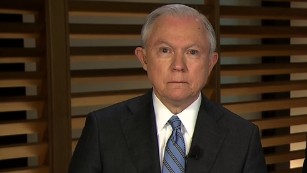Judges turn to extreme remedy to block Trump administration
(CNN)As the Trump administration seeks to obliterate Obama-era policies, progressive lawyers are racing to court asking for an extreme form of relief, urging judges to reach deep into their judicial tool kits and issue national — even global — injunctions.
Such injunctions are a relatively new phenomenon, and some legal scholars worry they are bad for the country and bad for courts.
The experts say the extreme remedy squelches the benefit of having multiple judges consider a question and gives lawyers an incentive to “judge shop” their cases to judges they believe will rule in their favor.
Court battles are raging across the country less than a year into the Trump administration. Already, federal judges have issued injunctions on various versions of President Donald Trump’s travel ban and his policy toward so-called sanctuary cities.
Finding success, liberal lawyers are also challenging — and sometimes asking for similar relief — in the areas of LGBT rights, Obama-era policies aimed at young undocumented immigrants brought to the US as children and the contraceptive mandate.
And that’s just the beginning.
Less than an hour after the administration announced a termination of cost-sharing reduction payments related to the Affordable Care Act late Thursday, attorneys general in New York and California warned they would go to court.
History of nationwide injunctions
In This Review
“There weren’t any national injunctions for most of US history,” said Samuel Bray, a law professor at UCLA School of Law. Bray said they started in the late 20th century but were rare until the last part of President Barack Obama’s second term, when Republican attorneys general started getting national injunctions to stop the Obama administration. Now, the tables are turned.
“Democratic attorneys general are getting national injunctions to stop the Trump administration. In just two short years, the national injunction went from rare to routine,” he said.
When weighing an injunction, a judge takes into consideration several factors, including whether there would be irreparable harm to the plaintiffs. But in a recent note for the NYU School of Law, Getzel Berger worried that while the injunctions are lawful, “they are often granted (or denied) without applying a coherent or unified principle.”
He argued that while they may be a potent tool to deliver quick relief, they can encourage lawyers to “forum shop,” or find a judge who will likely rule in their favor and issue overly broad relief.
Judge shopping
Supporters of the Obama administration say that is exactly what occurred when one district court judge blocked Obama’s executive actions on immigration in 2015. US District Judge Andrew Hanen froze the programs nationwide — a decision that was later upheld by a federal appeals court.
When the issue finally reached the Supreme Court, the justices were serving with only eight members before the nomination of Justice Neil Gorsuch. They split 4-4 in the case and were left simply affirming the lower court opinion, making the order of one district court judge catastrophic on a signature Obama-era policy.
Some judges worry about using the extreme tool.
“Essentially, what this means is one judge in one circuit gets to control the law until the Supreme Court intervenes,” Judge Alex Kozinski, who sits on the 9th Circuit Court of Appeals, said last summer. Kozinski was not referring to a specific case but speaking broadly about such injunctions.
“This is contrary to two centuries of federal policy, which is the idea that you have dueling views in the lower courts before a matter percolates to the Supreme Court and the Supreme Court can choose among different views,” he told an audience at the University of California, Irvine School of Law.
It’s a similar point Berger made in his paper. “Nationwide injunctions freeze novel and difficult legal questions in conformance with the holding of a single lower court, hindering dialogue among the circuits and stunting the development of the law.”
They also prompt parties to seek out a judge or judges who might rule in their favor. That’s why during the Obama administration, the conservative-leaning 5th Circuit Court of Appeals was where critics of the President would aim their litigation.
Once they found success, they returned there again and again.
Trump administration
Now that the Trump administration is in power, liberal lawyers are seeking relief at the more liberal-leaning courts, such as the 9th Circuit Court of Appeals.
The most notable recent national injunction occurred early in the Trump administration after the President’s first travel ban halting travel from several Muslim-majority countries in January triggered chaos in the airports.
US District Judge James Robart, who sits on the United States District Court for the Western District of Washington, granted a request to block key provisions of the travel ban against the government “nationwide.”
“The court finds that the states have met their burden of demonstrating that they face immediate and irreparable injury as a result of the signing and implementation of the executive order,” he ruled.
By March, the President had issued a new executive order, but that too was blocked “across the nation” by US District Judge Derrick Watson, who sits in Hawaii.
The ruling prompted Attorney General Jeff Sessions to tell a radio host, “I really am amazed that a judge sitting on an island in the Pacific can issue an order that stops the President of the United States from what appears to be clearly his statutory and constitutional power.”
Liberals seized on Sessions for suggesting that Hawaii was no more than an island floating in the middle of nowhere, and they said the nationwide order was necessary to bring order across the country.
In April, a federal judge in California temporarily enjoined a section of the President’s executive order meant to strip federal money from so-called sanctuary cities that harbor undocumented immigrants.
In a statement, the White House blasted the ruling.
“Today, the rule of law suffered another blow, as an unelected judge unilaterally rewrote immigration policy,” the statement read. “This case is yet one more example of egregious overreach by a single, unelected district judge.”
Yet back when the Obama administration suffered a similar fate at the hands of Hanen, then-Sen. Sessions had no complaints.
“Thankfully, over a year ago, Judge Andrew Hanen in the United States District Court for the Southern District of Texas issued an injunction that stopped the Obama administration from proceeding with its lawless immigration system,” Sessions said in a statement, according to WBRC in Alabama.
Experts say the issue isn’t about the merits of individual cases but instead about whether judges should be issuing rulings that impact the entire country.
Bray said when courts reach different conclusions, it might be messy, but, he said, eventually precedent gets settled.
“That’s how our legal system is supposed to work — many judges consider a question, and even if it’s slow and messy in the short run, in the end, we’re trying to get a better, more thoughtful result.”
He noted that if a judge issues an injunction in Hawaii that is also supposed to cover New York, it presents a basic problem.
“Federal judges are supposed to decide cases for the parties before them,” he said. “When one judge reaches out to give a remedy for everyone, including millions of people who aren’t before the court, that’s inconsistent with the judicial role established by the Constitution.”






